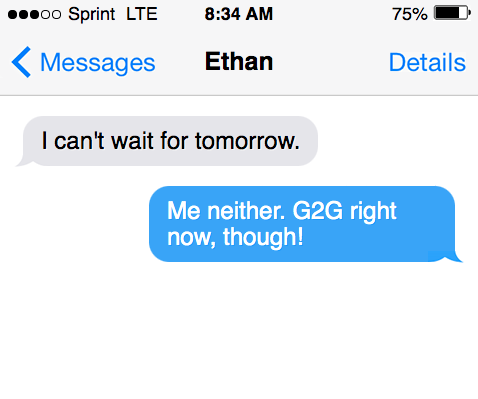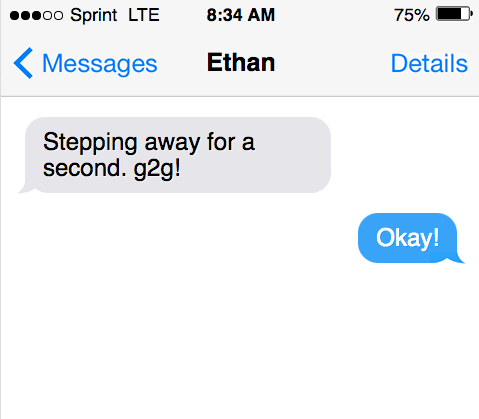What does “G2G” mean? When someone uses the internet slang term, “G2G,” what are they referring to? Is it referring to government agencies? Is it referring to something inappropriate? Can it get used in a business setting? The English language is changing thanks to the internet, texting, and online chat rooms.
Learn what “G2G” means in this short guide…
“G2G” meaning and definition
“G2G” simply means, “Got to Go.” It is a short form reference to someone who is intending to leave a conversation. Or has to step away from their digital device. The intended use of someone using the acronym “G2G” is to inform the other party they will not be able to respond to any messages until they return.

Capitalization
Most commonly, the acronym is used in either ALL CAPS or all lowercase letters.
Correct: G2G
Correct: g2g
Incorrect: g 2 g
Incorrect: G2g
Common uses
Typical uses for the abbreviation include the following:
- When having communication in an online game.
- When needing to inform someone in an online chat that they need to step away.
- Social media platforms. Including Snapchat, Instagram, and TikTok.
- Lastly, during a text conversation where someone intends to stop the conversation.
Other meanings
Less common meanings of “G2G” are:
While many organizations use “G2G” in their name, if there is communication between two people over the internet or text—it’s unlikely it’s referring to the organizations or businesses.
History of “G2G”
Urban Dictionary dates the use of “G2G” back to 2003. “G2G” as an internet slang term is nearly as old as other acronyms like “LOL” or “OMG.”

Examples of “G2G” getting used
Here are conversation examples where someone could use the acronym “G2G”:
Example one
Friend 1: “I can’t wait to go to the park this weekend, it’s going to be very nice out.”
Friend 2: “Me too. Have to run. G2G. Talk later!”
In this example, the second friend is needing to end the conversation. They are informing the other person that they will be stepping away from their digital device, computer, or other form of communication.
Example two
Man 1: “I can’t wait to see you this weekend, it’s going to be fun.”
Girl 1: “G2G”
This example shows a man and woman having a conversation. Frequently confused or misunderstood as the other person being cold when they reply, “G2G.” It’s important in settings like this not to read too far into the situation and ask for clarity if confused about the meaning behind the response.
Similar short forms and internet abbreviations
Other similar short forms and terms that could get used:
TTYL: When someone says this acronym, it means “talk to you later.” This is another form of communication where a person needs to step away from the computer.
L8R: Another acronym that means “later.” This is when someone is saying goodbye and is choosing to use a shorter form of the word.
BBL: Or “Be Back Later,” is another way for someone to inform another person that they intend to return to their device at a later time. Used to assist someone in managing expectations about a response time to future communication.
Sources
- G2G Meaning
- What Does G2G Mean? – Cyber Definitions
- What Does G2G Stand For? The Free Dictionary
- What Does G2G Mean and Stand For? – 7ESL
Inside this article
Fact checked:
Content is rigorously reviewed by a team of qualified and experienced fact checkers. Fact checkers review articles for factual accuracy, relevance, and timeliness. Learn more.
Core lessons
Glossary
- Abstract Noun
- Accusative Case
- Anecdote
- Antonym
- Active Sentence
- Adverb
- Adjective
- Allegory
- Alliteration
- Adjective Clause
- Adjective Phrase
- Ampersand
- Anastrophe
- Adverbial Clause
- Appositive Phrase
- Clause
- Compound Adjective
- Complex Sentence
- Compound Words
- Compound Predicate
- Common Noun
- Comparative Adjective
- Comparative and Superlative
- Compound Noun
- Compound Subject
- Compound Sentence
- Copular Verb
- Collective Noun
- Colloquialism
- Conciseness
- Consonance
- Conditional
- Concrete Noun
- Conjunction
- Conjugation
- Conditional Sentence
- Comma Splice
- Correlative Conjunction
- Coordinating Conjunction
- Coordinate Adjective
- Cumulative Adjective
- Dative Case
- Determiner
- Declarative Sentence
- Declarative Statement
- Direct Object Pronoun
- Direct Object
- Diction
- Diphthong
- Dangling Modifier
- Demonstrative Pronoun
- Demonstrative Adjective
- Direct Characterization
- Definite Article
- Doublespeak
- False Dilemma Fallacy
- Future Perfect Progressive
- Future Simple
- Future Perfect Continuous
- Future Perfect
- First Conditional
- Irregular Adjective
- Irregular Verb
- Imperative Sentence
- Indefinite Article
- Intransitive Verb
- Introductory Phrase
- Indefinite Pronoun
- Indirect Characterization
- Interrogative Sentence
- Intensive Pronoun
- Inanimate Object
- Indefinite Tense
- Infinitive Phrase
- Interjection
- Intensifier
- Infinitive
- Indicative Mood
- Participle
- Parallelism
- Prepositional Phrase
- Past Simple Tense
- Past Continuous Tense
- Past Perfect Tense
- Past Progressive Tense
- Present Simple Tense
- Present Perfect Tense
- Personal Pronoun
- Personification
- Persuasive Writing
- Parallel Structure
- Phrasal Verb
- Predicate Adjective
- Predicate Nominative
- Phonetic Language
- Plural Noun
- Punctuation
- Punctuation Marks
- Preposition
- Preposition of Place
- Parts of Speech
- Possessive Adjective
- Possessive Determiner
- Possessive Case
- Possessive Noun
- Proper Adjective
- Proper Noun
- Present Participle
- Prefix
- Predicate



